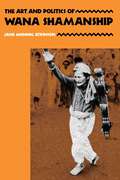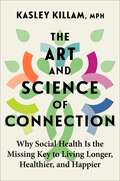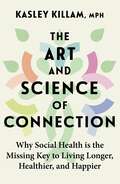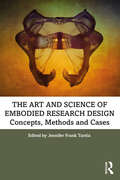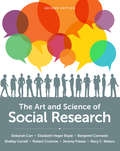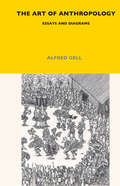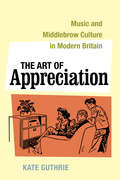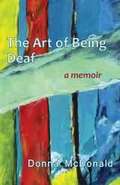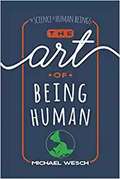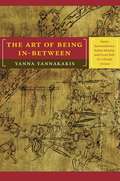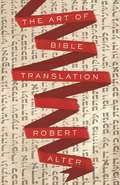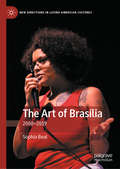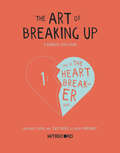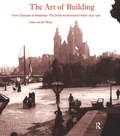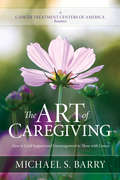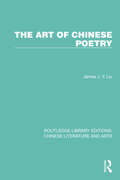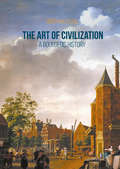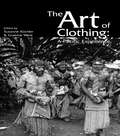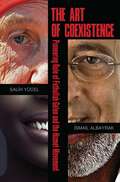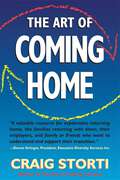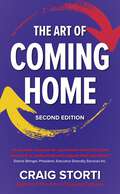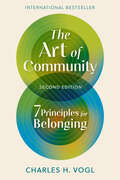- Table View
- List View
The Art and Politics of Wana Shamanship
by Jane Monnig AtkinsonRituals are valued by students of culture as lenses for bringing facets of social life and meaning into focus. Jane Monnig Atkinson's carefully crafted study offers unique insight into the rich shamanic ritual tradition of the Wana, an upland population of Sulawesi, Indonesia.
The Art and Science of Connection: Why Social Health Is the Missing Key to Living Longer, Healthier, and Happier
by Kasley KillamA groundbreaking redefinition of what it means to be healthy that introduces the need for social health—the part of wellbeing that comes from feeling connected—to truly flourish.Exercise. Eat a balanced diet. Go to therapy. Most wellness advice is focused on achieving and maintaining good physical and mental health. But Harvard-trained social scientist and pioneering social health expert Kasley Killam reveals that this approach is missing a vital component: human connection. Relationships not only make us happier, but also are critical to our overall health and longevity. Research shows that people with a strong sense of belonging are 2.6 times more likely to report good or excellent health. Perhaps even more astonishingly, people who lack social support are up to 53% more likely to die from any cause. Yet social health has been overlooked and underappreciated—until now.Just as we exercise our physical muscles, we can strengthen our social muscles. Weaving together cutting-edge science, mindset shifts, and practical wisdom, Killam offers the first methodology for how to be socially healthy. An antidote to the loneliness epidemic and an inspiring manifesto for seeing wellbeing as not only physical and mental, but also social, The Art and Science of Connection is a handbook for thriving. In this essential book, you will:Learn a simple yet powerful framework to understand, evaluate, and bolster your social health.Discover the exact strategy or habit you need, as well as research-backed tips, to cultivate and sustain meaningful connection now and throughout your life.Glean actionable insights to develop a sense of community in your neighborhood, at work, and online from a spirited group of neighbors in Paris, the CEO of a major healthcare company, and an artificially intelligent chatbot.Get an insider look at the innovative ways that doctors, teachers, entrepreneurs, architects, government leaders, and everyday people are catalyzing a movement toward a more socially healthy society.The Art and Science of Connection will transform the way you think about each interaction with a friend, family member, coworker, or neighbor, and give you the tools you need to live a more connected and healthy life—whether you are an introvert or extrovert, if you feel stretched thin, and no matter your age or background. Along the way, Killam will reveal how a university student, a newlywed, a working professional, and a retired widow overcame challenges to thrive through connection—and how you can, too.
The Art and Science of Connection: Why Social Health is the Missing Key to Living Longer, Healthier, and Happier
by Kasley KillamA groundbreaking redefinition of what it means to be healthy that introduces the need for social health - the part of wellbeing that comes from feeling connected - to truly flourish.Exercise. Eat a balanced diet. Go to therapy. Most wellness advice is focused on achieving and maintaining good physical and mental health. But Harvard-trained social scientist and pioneering social health expert Kasley Killam reveals that this approach is missing a vital component: human connection.Relationships not only make us happier, but also are critical to our overall health and longevity. Research shows that people with a strong sense of belonging are 2.6 times more likely to report good or excellent health. Perhaps even more astonishingly, people who lack social support are up to 53% more likely to die from any cause. Yet social health has been overlooked and underappreciated - until now.Just as we exercise our physical muscles, we can strengthen our social muscles. Weaving together cutting-edge science, mindset shifts, and practical wisdom, Killam offers the first methodology for how to be socially healthy. An antidote to the loneliness epidemic and an inspiring manifesto for seeing wellbeing as not only physical and mental, but also social, The Art and Science of Connection is a handbook for thriving.In this essential book, you will:- Learn a simple yet powerful framework to understand, evaluate, and bolster your social health.- Discover the exact strategy or habit you need, as well as research-backed tips, to cultivate and sustain meaningful connection now and throughout your life.- Glean actionable insights to develop a sense of community in your neighbourhood, at work, and online from a spirited group of neighbours in Paris, the CEO of a major healthcare company, and an artificially intelligent chatbot.- Get an insider look at the innovative ways that doctors, teachers, entrepreneurs, architects, government leaders, and everyday people are catalysing a movement toward a more socially healthy society.The Art and Science of Connection will transform the way you think about each interaction with a friend, family member, coworker, or neighbour, and give you the tools you need to live a more connected and healthy life - whether you are an introvert or extrovert, if you feel stretched thin, and no matter your age or background. Along the way, Killam will reveal how a university student, a newlywed, a working professional, and a retired widow overcame challenges to thrive through connection-and how you can, too.
The Art and Science of Embodied Research Design: Concepts, Methods and Cases
by Edited by Jennifer Frank TantiaThe Art and Science of Embodied Research Design: Concepts, Methods, and Cases offers some of the nascent perspectives that situate embodiment as a necessary element in human research. This edited volume brings together philosophical foundations of embodiment research with application of embodied methods from several disciplines. The book is divided into two sections. Part I, Concepts in Embodied Research Design, suggests ways that embodied epistemology may bring deeper understanding to current research theory, and describes the ways in which embodiment is an integral part of the research process. In Part II, Methods and Cases, chapters propose novel ways to operationalize embodied data in the research process. The section is divided into four sub-sections: Somatic Systems of Analysis, Movement Systems of Analysis, Embodied Interviews and Observations, and Creative and Mixed Methods. Each chapter proposes a method case; an example of a previously used research method that exemplifies the way in which embodiment is used in a study. As such, it can be used as scaffold for designing embodied methods that suits the researcher’s needs. It is suited for many fields of study such as psychology, sociology, behavioral science, anthropology, education, and arts-based research. It will be useful for graduate coursework in somatic studies or as a supplemental text for courses in traditional research design.
The Art and Science of Social Research (Second Edition)
by Robert Crosnoe Mary C. Waters Deborah Carr Benjamin Cornwell Elizabeth Heger Boyle Shelley Correll Jeremy FreeseShow your students how social research really unfolds. Written by a team of renowned sociologists with experience in both the field and the classroom, The Art and Science of Social Research offers authoritative, accessible, and balanced coverage of the methods used to study the social world. The authors highlight the challenges of investigating the unpredictable topic of human lives while providing insights into what really happens in the field, the laboratory, and the survey call center. This purchase offers access to the digital ebook only.
The Art and Science of Teaching Orientation and Mobility to Persons with Visual Impairments
by William H. JacobsonTeaching orientation, mobility and space perception to blind people.
The Art of Anthropology: Essays and Diagrams (London School Of Economics Monographs On Social Anthropology Ser. #Vol. 67)
by Alfred GellThe Art of Anthropology collects together the most influential of Gell's writings, which span the past two decades, with a new introductory chapter written by Gell. The essays vividly demonstrate Gell's theoretical and empirical interests and his distinctive contribution to several key areas of current anthropological enquiry. A central theme of the essays is Gel's highly original exploration of diagrammatic imagery as the site where social relations and cognitive processes converge and crystallise. Gell tracks this imagery across studies of tribal market transactions, dance forms, the iconicity of language and his most recent and groundbreaking analyses of artworks.Written with Gell's characteristic fluidity and grace and generously illustrated with Gell's original drawings and diagrams, the book will interest art historians, sociologists and geographers no less than anthropologists, challenging, as it does, established ideas about exchange, representation, aesthetics, cognition and spatial and temporal processes.
The Art of Appreciation: Music and Middlebrow Culture in Modern Britain (California Studies in 20th-Century Music #30)
by Kate GuthrieFrom the BBC Proms to Bernstein's Young People's Concerts, initiatives to promote classical music have been a pervasive feature of twentieth-century musical life. The goal of these initiatives was rarely just to reach a larger and more diverse audience but to teach a particular way of listening that would help the public "appreciate" music. This book examines for the first time how and why music appreciation has had such a defining and long-lasting impact—well beyond its roots in late-Victorian liberalism. It traces the networks of music educators, philanthropists, policy makers, critics, composers, and musicians who, rather than resisting new mass media, sought to harness their pedagogic potential. The book explores how listening became embroiled in a nexus of modern problems around citizenship, leisure, and education. In so doing, it ultimately reveals how a new cultural milieu—the middlebrow—emerged at the heart of Britain's experience of modernity.
The Art of Archer: (Apple FF)
by Neal HolmanA fully illustrated and highly visual guide to everything Archer—from storyboards to character sketches to script excerpts—making it a collector’s item for Archer fans everywhere.The Art of Archer is a comprehensive look behind the scenes of the award-winning animated series. Featuring 240 pages of concept art, exclusive interviews, script excerpts and the never-before-released original pitch for the series, this amazing collection offers an utterly unique view of the Archer creative process.Commentary from the crew will walk fans all the way from squiggles to the gorgeous final picture, detailing not only their process but their history as well. Exclusive interviews with the Emmy-nominated cast offer insights to their beloved characters and a glimpse of their favorite moments. With storyboards, costume designs, reference photographs, immaculate background paintings and more, this is Archer as you have never seen it.The Art of Archer is a must have companion to the groundbreaking animated series, for fans and cinephiles alike.
The Art of Attracting Beautiful Women
by Greg DeanA powerful dating advice bible for men. Are you sick of having little success with women and afraid you will continue to stay forever single? Are you low in confidence and cannot find a way out? The Art of Attracting Beautiful Women is a deep, philosophical and complete technical guide to meeting an amazing and stunning woman. Renowned date coach, Greg Dean explores his extraordinary dating tips and social dynamic theories in a way you have never read before. This is not only a step by step guide on how to attract and seduce women, it will give you the psychological mindset, realisations about your true worth and the confidence to attract women in abundance in a way you may have never explored before.
The Art of Being Deaf: A Memoir
by Donna McDonaldConcerned about aspects of her romantic relationships, Donna McDonald consulted with a psychologist who asked, “Your hearing loss must have had a big impact on you?” At age 45, with a successful career in social work policy, McDonald took umbrage at the question. Then, she realized that she never had addressed the personal barrier she had constructed between her deaf-self and her hearing persona. In The Art of Being Deaf, she describes her long, arduous pursuit of finding out exactly who she was. Born in 1950s Australia, McDonald was placed in an oral deaf school when she was five. There, she was trained to communicate only in spoken English. Afterwards, she attended mainstream schools where she excelled with speechreading and hard work. Her determination led to achievements that proved her to be “the deaf girl that had made good.” Yet, despite her constant focus on fitting in the hearing world, McDonald soon realized that she missed her deaf schoolmates and desired to explore her closed-off feelings about being deaf. When she reconnected with her friends, one urged her to write about her experiences to tell all about “the Forgotten Generation, the orally-raised deaf kids that no one wants to talk about.” In writing her memoir, McDonald did learn to reconcile her deaf-self with her “hearing-deaf” persona, and she realized that the art of being deaf is the art of life, the art of love.
The Art of Being Human
by Michael WeschAnthropology is the study of all humans in all times in all places. But it is so much more than that. “Anthropology requires strength, valor, and courage,” Nancy Scheper-Hughes noted. “Pierre Bourdieu called anthropology a combat sport, an extreme sport as well as a tough and rigorous discipline. … It teaches students not to be afraid of getting one’s hands dirty, to get down in the dirt, and to commit yourself, body and mind. Susan Sontag called anthropology a “heroic” profession.” What is the payoff for this heroic journey? You will find ideas that can carry you across rivers of doubt and over mountains of fear to find the the light and life of places forgotten. Real anthropology cannot be contained in a book. You have to go out and feel the world’s jagged edges, wipe its dust from your brow, and at times, leave your blood in its soil. In this unique book, Dr. Michael Wesch shares many of his own adventures of being an anthropologist and what the science of human beings can tell us about the art of being human. This special first draft edition is a loose framework for more and more complete future chapters and writings. It serves as a companion to anth101.com, a free and open resource for instructors of cultural anthropology.This 2018 text is a revision of the "first draft edition" from 2017 and includes 7 new chapters.
The Art of Being In-Between: Native Intermediaries, Indian Identity, and Local Rule in Colonial Oaxaca
by Yanna YannakakisIn The Art of Being In-between Yanna Yannakakis rethinks processes of cultural change and indigenous resistance and accommodation to colonial rule through a focus on the Sierra Norte of Oaxaca, a rugged, mountainous, ethnically diverse, and overwhelmingly indigenous region of colonial Mexico. Her rich social and cultural history tells the story of the making of colonialism at the edge of empire through the eyes of native intermediary figures: indigenous governors clothed in Spanish silks, priests' assistants, interpreters, economic middlemen, legal agents, landed nobility, and "Indian conquistadors. " Through political negotiation, cultural brokerage, and the exercise of violence, these fascinating intercultural figures redefined native leadership, sparked indigenous rebellions, and helped forge an ambivalent political culture that distinguished the hinterlands from the centers of Spanish empire. Through interpretation of a wide array of historical sources--including descriptions of public rituals, accounts of indigenous rebellions, idolatry trials, legal petitions, court cases, land disputes, and indigenous pictorial histories--Yannakakis weaves together an elegant narrative that illuminates political and cultural struggles over the terms of local rule. As cultural brokers, native intermediaries at times reconciled conflicting interests, and at other times positioned themselves in opposing camps over the outcome of municipal elections, the provision of goods and labor, landholding, community ritual, the meaning of indigenous "custom" in relation to Spanish law, and representations of the past. In the process, they shaped an emergent "Indian" identity in tension with other forms of indigenous identity and a political order characterized by a persistent conflict between local autonomy and colonial control. This innovative study provides fresh insight into colonialism's disparate cultures and the making of race, ethnicity, and the colonial state and legal system in Spanish America.
The Art of Bible Translation
by Robert AlterAn award-winning biblical translator reflects on the art of capturing the literary power of the Bible in EnglishIn this brief book, award-winning biblical translator and acclaimed literary critic Robert Alter offers a personal and passionate account of what he learned about the art of Bible translation over the two decades he spent completing his own English version of the Hebrew Bible.Alter’s literary training gave him the advantage of seeing that a translation of the Bible can convey the text’s meaning only by trying to capture the powerful and subtle literary style of the biblical Hebrew, something the modern English versions don’t do justice to. The Bible’s style, Alter writes, “is not some sort of aesthetic embellishment of the ‘message’ of Scripture but the vital medium through which the biblical vision of God, human nature, history, politics, society, and moral value is conveyed.” And, as the translators of the King James Version knew, the authority of the Bible is inseparable from its literary authority.For these reasons, the Bible can be brought to life in English only by re-creating its literary virtuosity, and Alter discusses the principal aspects of style in the Hebrew Bible that any translator should try to reproduce: word choice, syntax, word play and sound play, rhythm, and dialogue. In the process, he provides an illuminating and accessible introduction to biblical style that also offers insights about the art of translation far beyond the Bible.
The Art of Brasília: 2000-2019 (New Directions in Latino American Cultures)
by Sophia BealPeople from outside of Brasília often dismiss Brazil’s capital as socially divided, boring, corrupt, and emotionally cold. Apparently its founders created not a vibrant capital, but a cultural wasteland. However, as Sophia Beal argues, Brasília’s contemporary artists are out to prove the skeptics wrong. These twenty-first-century artists are changing how people think about the city and animating its public spaces. They are recasting Brasília as a vibrant city of the arts in which cultural production affirms a creative right to the city. Various genres—prose, poetry, film, cultural journalism, music, photography, graffiti, street theater, and street dance—play a part. Brasília’s initial 1960s art was state-sanctioned, carried out mainly by privileged, white men. In contrast, the capital’s contemporary art is marked by its diversity, challenging norms about who has a voice within the Brasília art scene. This art demystifies the capital’s inequities and imagines alternative ways of inhabiting the city.
The Art of Breaking Up
by HitRECordJoseph Gordon-Levitt’s creative collaborative community HITRECORD looks at love from both sides in this ingenious flippable book.So, you just got dumped, huh? Or did you just dump someone? Doesn’t matter who ended it. Either way, you’re sleeping alone tonight. But don’t worry, you’re not really alone. HITRECORD’s global community of over 750,000 active artists is here to help with The Art of Breaking Up, a new book designed to get you through this trying time.That’s over 750,000 people who know the soul-crushing pain of a broken heart. But instead of wallowing forever in vats of unproductive (but delicious) cookie dough, they’ve channeled all that misery into an insightful, funny, and smart compendium of musings, photography, drawings, collages, puzzles, recipes, games, and more—designed to explore (and distract from) the mind-numbing agony of a romantic breakup. You’ll laugh, you’ll smile, and you’ll probably cry. Everyone knows there are two sides to every break-up, so this book features a double-sided, flippable structure. One side eases the tortured consciences of the HEARTBREAKERS. Flip the book, and the other side considers the plight of the BROKEN-HEARTED. Both sides are organized chronologically with chapters that correspond to the emotional trajectory of both the HEARTBREAKER and BROKEN-HEARTED. Chapters include: Early Warning Signs, Exit Strategy, The Break Up, Acceptance, Depression, Bargaining, Anger, and Denial. Where the two sections meet in the middle there is a compelling, heart-wrenching moment where the HEARTBREAKER and BROKEN-HEARTED connect again, but we’re not giving that away.Inside this book you’ll find plenty of art, stories, comics, and other amusements, such as a Post-Break-Up Relationship Survey, Denial Yoga, Candy Hearts for Assholes, Breakup Greeting Cards, Hex Your Ex Voodoo Doll, The Free Bird Word Search Game, and a playlist or two, including "Right Back at Ya," a collection of songs to stoke the burning rage in your heart. Everything you’ll find in this book was made collaboratively by people from around the world on HITRECORD–an online creative platform for collaborative art and media projects founded and directed by Joseph Gordon-Levitt. With its universal, all-inclusive approach to the subject, The Art of Breaking Up is an acute observation of love and heartbreak in modern times, and maybe–just maybe–a salve for anyone with a broken heart.
The Art of Building: International Ideas, Dutch Debate 1840-1900 (Routledge Revivals)
by Auke Van Der WoudThis title was first published in 2002: In the second half of the 18th century, philosophy provided the fundamental characteristics of architechture. The architects of the 19th century then introduced the empirical comparative study of buildings. This phenomenon has usually been regarded exclusively in terms of historicism, but this is to underestimate the fact that they were architects. The problems for which they sought solutions did not belong to the past, but were part of their own age or the future. The architecture of the past was, to the 19th-century architect, significant to a large degree as a silent witness of a bygone era - a representation of beauty. Historical architecture provided study material for their inquiries into the aesthetic "laws" that they hoped would give the 19th century a splendid contemporary architecture. The art of building, as a way of visibly edifying society, was the most important of all the arts, with architectural theory showing the way to this lofty purpose. This book takes this as a starting point. Focusing on place as well as time, the text discusses the Dutch architects who contributed to this idea, discussing several of the most important, but ultimately seeing their activities, not as the cause, but the expression of movements that continuously changed the face of architecture. The particularly "Dutch" nature of architecture took "visual beauty" to result from the visible success of technical intelligence and creativity rather than philosophy and aesthetics. The grand-19th century themes discussed in the book are, the author suggests, somewhat "un-Dutch", originating as they did from an idealist, intellectual tradition.
The Art of Caregiving
by Michael S. BarryWritten to encourage the caregiver, The Art of Caregiving will be a candle of joyful hope to the one whose life has taken on unique new challenges when a loved one faces cancer.Cancer treatment is often a nighttime journey through a wilderness, during which patients and their caregivers are confronted with worry and fear; a journey where the slightest flicker of hope means more than words can express.Michael S. Barry shows how, with God's help, you can be the light of hope for those who bear the burden of illness.
The Art of Chinese Poetry (Routledge Library Editions: Chinese Literature and Arts #1)
by James J.Y. LiuThis book, first published in 1962, is a majestic survey of the whole structure of Chinese poetry. It is a critical introduction to the field as well as an exposition of Chinese views on the nature of poetry. It discusses the Chinese language as a poetic medium from various angles – visual, semantic, auditory, grammatical and conceptual. It also describes the bases of Chinese versification and the major verse forms, and offers interpretations of various schools of traditional Chinese criticisms of poetry. The author suggests a synthesis among the different schools and evolves a view of poetry from which critical standards for Chinese poetry can be derived. In applying these standards, he attempts a further synthesis – one between this mainly traditional Chinese view of poetry and the modern Western method of verbal analysis. Imagery, symbolism, allusions and other features of Chinese poetry are analysed critically.
The Art of Civilization
by Didier MaleuvreDidier Maleuvre argues that works of art in Western societies from Ancient Greece to the interconnected worlds of the Digital Age have served to rationalize and normalize an engagement with bourgeois civilization and the city. Maleuvre details that the history of art itself is the history civilization, giving rise to the particular aesthetics and critical attitudes of respective moments and movements in changing civilizations in a dialogical mode. Building a visual cultural account of shifting forms of culture, power, and subjectivity, Maleuvre illustrates how art gave a pattern and a language to the model of social authority rather than simply functioning as a reflective one. Through a broad cultural study of the relationship between humanity, art, and the culture of civilization, Maleuvre introduces a new set of paradigms that critique and affirm the relationship between humanity and art, arguing for it as an engine of social reproduction that transforms how culture is inhabited.
The Art of Clothing: A Pacific Experience
by Graeme Were Susanne KüchlerThe Art of Clothing: A Pacific Experience is a collection of richly textured and tremendously engaging empirical studies of cloth and clothing in colonial and post-colonial Pacific contexts. By challenging readers to reconsider the very nature of the materiality of clothing, the editors productively situate this volume at the intersection of a number of ongoing interdisciplinary projects that are coalescing around an interest in cloth and clothing. The book as a whole speaks lucidly to issues of current concern in a wide range of academic fields - including cultural studies, material culture, Pacific history, art history, history of religions, and museum studies.
The Art of Coexistence: Pioneering Role of Fethullah Gulen and the Hizmet Movement
by Ismail Albayrak Salih YucelThe global threat of war, terrorism, the increased gap between poor and rich, famine, malnutrition, global warming and pollution, and many other social and cultural problems, pose a real challenge for present citizens of the globe. Intellectuals and politicians take these challenges as their primary concerns. Despite the existence of some pessimists, there are a number of initiatives working for the common good and expending great effort to solve these problems. The Hizmet (Gulen) Movement is one of the most influential initiatives that should be taken into consideration in this context. Fethullah Gulen is a Turkish Muslim scholar whose ideas have inspired and influenced many Turkish intellectuals, educators, students, businessmen, politicians and journalists inside and outside Turkey to establish schools, educational and intercultural centers, and humanitarian aid organizations in more than one hundred fifty countries. Yucel and Albayrak cover the Hizmet Movement under the leadership of Fethullah Gulen from various perspectives in order to shed lights on current discussions.
The Art of Coming Home
by Craig StortiUpdated 2nd Edition!If you were lucky, you knew about and were prepared for culture shock when you moved overseas, but unless you are very lucky, you probably don&’t know about and are not prepared for reverse culture shock. And you should be. Most expats find coming home after an overseas assignment more difficult than adjusting to a foreign culture—and very few organizations and companies prepare people for the experience.Veteran trainer and consultant Craig Storti sketches the workplace challenges faced by returning businessmen and women as well as the re-entry issues of spouses, younger children, and teenagers. He also addresses in detail the special issues faced by exchange students, international development volunteers, and military and missionary personnel and their families.If you&’re about to relocate abroad, are already living abroad, about to come home, or already home, this book walks you through the biggest adjustments, personal and professional, and in this new edition presents a complete do-it-yourself repatriation workshop to help you identify and address your individual readjustment issues.
The Art of Coming Home
by Craig StortiIf you were lucky, you knew about and were prepared for culture shock when you moved overseas, But unless you are very lucky, you probably don't know about and are not prepared for reverse culture shock. And you should be. Most expats find coming home after an overseas assignment more difficult than adjusting to a foreign culture-and very few organizations and companies prepare people for the experience.Veteran trainer and consultant Craig Storti sketches the workplace challenges faced by returning businessmen and women as well as the re-entry issues of spouses, younger children, and teenagers. He also addresses in detail the special issues faced by exchange students, international development volunteers, and military and missionary personnel and their families.From leave-taking and the honeymoon stage through to reverse culture shock and eventual readjustment, The Art of Coming Home lays out the four stages of the re-entry process and details practical strategies for dealing with the challenges you will face each step of the way.Whether you're about to relocate abroad, are already living abroad, about to come home, or already home, this book walks you through the biggest adjustments, personal and professional, and in this new edition presents a complete do-it-yourself repatriation workshop to help you identify and address your individual readjustment issues.
The Art of Community, Second Edition: 7 Principles for Belonging
by Charles H. VoglSecond edition of this bestselling book on creating robust, thriving, positive communities using seven ancient principles any organization can follow.Now with 25% new content, including a chapter on building virtual communities.Healthy communities strive for their members to support one another, share their passions, and achieve personal growth. This book will help you learn to be connected and defeat loneliness by understanding where and how we belong. No matter the kind of organization, company, or social group, this book is a guide for leaders seeking to build a community or strengthen the ones they already have.Drawing on both 3,000 years of history and his personal experience, Charles Vogl lays out seven time-tested principles for developing connected communities that last. These include:•Boundary: The boundary between members and outsiders•Initiation: The activities that mark a new member•Rituals: The things we do that have meaning•Temple: A place set aside to find our community•Stories: What we share that allows others and ourselves to know our values•Symbols: The things that represent ideas that are important to us•Inner Rings: A path to growth as we participateWith hands-on tools for applying these principles to any group-formal or informal, mission driven or social, physical or virtual-this book will guide you in your journey to become a community builder that brings people together
